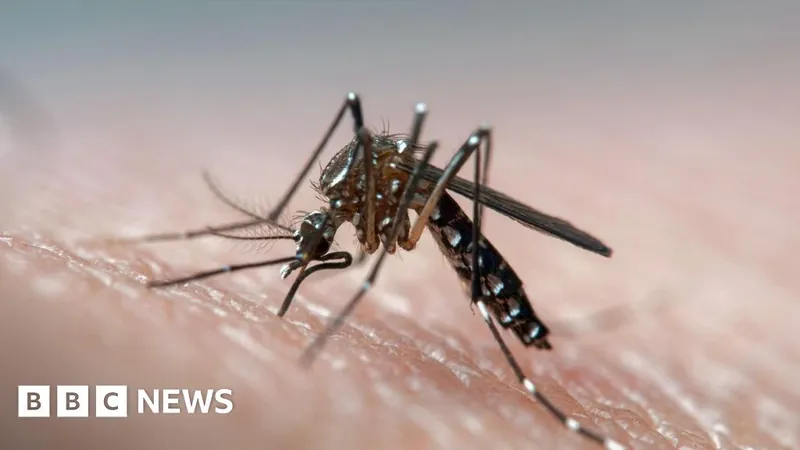
Breakthrough in Dengue Control: Scientists Render Male Mosquitoes Deaf to Combat Disease Spread
2024-11-05
Author: Siti
Introduction
In a groundbreaking study, scientists have discovered an innovative strategy to combat mosquito-borne diseases such as dengue, yellow fever, and Zika virus by making male mosquitoes deaf, thereby hindering their ability to mate and reproduce effectively.
The Role of Hearing in Mosquito Mating
Mosquito mating is a complex aerial dance where males utilize their acute sense of hearing to locate female partners through their distinctive wingbeats. This reliance on auditory signals is now at the center of a novel approach developed by researchers at the University of California, Irvine, who focused on Aedes aegypti mosquitoes— notorious carriers responsible for infecting around 400 million people annually.
Genetic Modification in Experiment
In their experiment, scientists manipulated a specific genetic pathway vital for the mosquitoes' hearing capability. Surprisingly, the surprisingly effective alteration resulted in male mosquitoes failing to physically contact any females, even after cohabiting in the same environment for three days. This remarkable discovery indicates that if males cannot effectively hear the females, their chances of mating drastically diminish.
Targeting Auditory Proteins
The key to this revolutionary approach lies in targeting a protein known as trpVa, which is critical for auditory perceptions in these insects. Following the genetic modification, the neurons responsible for processing sound failed to respond to any mating calls—thus rendering the male mosquitoes completely oblivious.
Comparison with Wild Mosquitoes
In contrast, their wild counterparts continued to mate with ease, successfully fertilizing a high percentage of females in a shared space. The study, published in the prestigious journal PNAS, was co-authored by a team from the University of California, Santa Barbara, and indicated an 'absolute' disruption in the mating patterns of the deaf male mosquitoes.
Expert Perspectives
Dr. Joerg Albert, a prominent mosquito mating expert from the University of Oldenburg in Germany, weighed in on the implications of this research. He proposed that targeting auditory capabilities could be a promising avenue for disease control, emphasizing the necessity for further studies to manage this method responsibly.
'This study provides the first direct molecular evidence showing that hearing is not just significant but essential for mosquito reproduction,' Dr. Albert noted. He further cautioned that without acoustic signals, male mosquitoes could face the risk of extinction.
Multi-faceted Approach to Disease Control
Aside from this pioneering technique, scientists are also examining the release of sterile male mosquitoes in regions heavily affected by mosquito-borne diseases, providing a multi-faceted approach to tackling this global health issue.
Ecological Considerations
While mosquitoes often bear a negative reputation due to their role in disease transmission, it is important to recognize their ecological importance as a source of sustenance for a variety of wildlife, including fish, birds, bats, and frogs. Moreover, they play a key role in pollination, underscoring the need for balanced and thoughtful approaches in managing mosquito populations.
Conclusion
This innovative study ushers in a new era of mosquito control measures that could significantly decrease the incidence of debilitating diseases like dengue, potentially saving countless lives in the process.



 Brasil (PT)
Brasil (PT)
 Canada (EN)
Canada (EN)
 Chile (ES)
Chile (ES)
 España (ES)
España (ES)
 France (FR)
France (FR)
 Hong Kong (EN)
Hong Kong (EN)
 Italia (IT)
Italia (IT)
 日本 (JA)
日本 (JA)
 Magyarország (HU)
Magyarország (HU)
 Norge (NO)
Norge (NO)
 Polska (PL)
Polska (PL)
 Schweiz (DE)
Schweiz (DE)
 Singapore (EN)
Singapore (EN)
 Sverige (SV)
Sverige (SV)
 Suomi (FI)
Suomi (FI)
 Türkiye (TR)
Türkiye (TR)